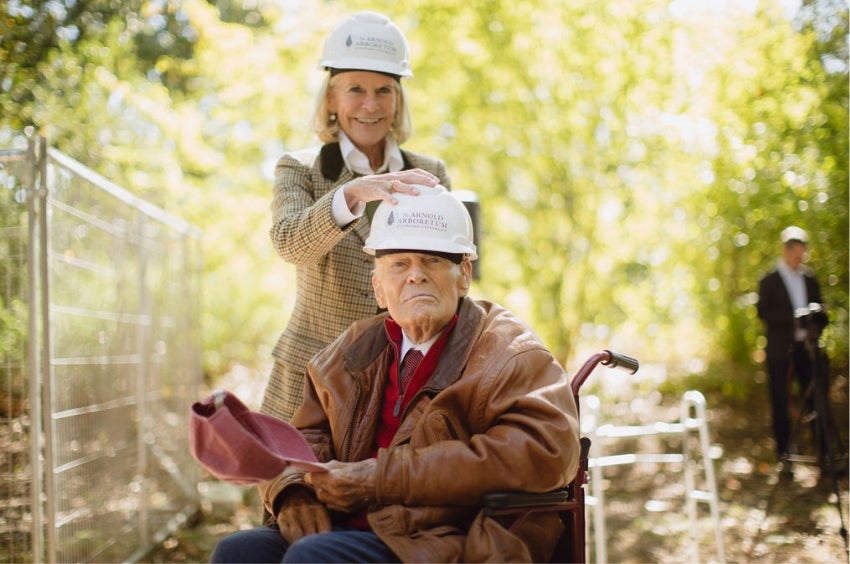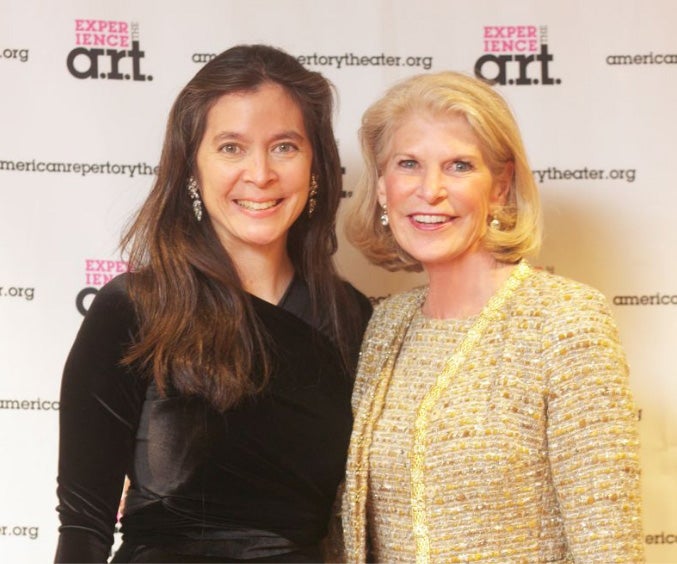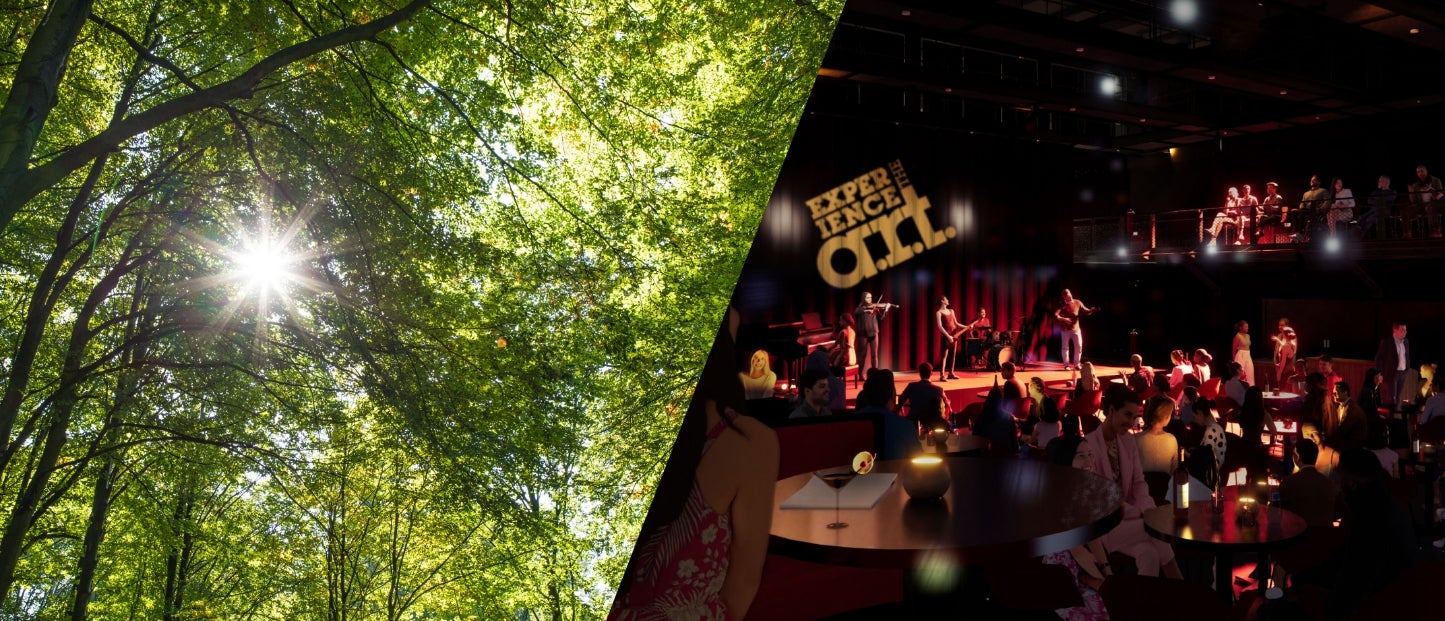Growing up in Lynn, Massachusetts, RoAnn Costin AB ’74 and her siblings made frequent visits to nearby Lynn Woods with their father, Thomas P. Costin Jr., who would regale them with tales of pirate treasure buried deep within a forest cave known as Dungeon Rock. A civic leader who served as a Lynn city councilor, mayor, and postmaster, Thomas Costin has dedicated his life and career to championing civil rights, urban renewal, and green space for all (including permanently protecting 2,000 acres of Lynn Woods from development). In those family adventures to the local forest, RoAnn was inspired by the majesty of the trees, and while she never happened upon any pirate’s plunder, her father’s dual passions for nature and community firmly took root in her.
With these values at heart, she recently made gifts to the Arnold Arboretum and the American Repertory Theater (A.R.T.) in honor of her 50th Radcliffe College Reunion—continuing her father’s commitment to the public good by helping to expand access to spaces for diverse communities to gather and connect.
Opening the Gates at the Arnold Arboretum
A unique public-private partnership between Harvard University and the City of Boston, the Arnold Arboretum is home to more than 16,000 plants cultivated across 281 acres of rolling landscape and winding paths. Designed by renowned landscape architect Frederick Law Olmsted, who also designed Lynn Woods, the Arboretum has long operated in service to Olmsted’s philosophy that public parks are an essential component of democracy, where people from different walks of life can connect and find common ground.
As it approached its 150th anniversary in 2022, the Arboretum set out to renew this founding promise by initiating the Sesquicentennial Entrance Improvement Project. The first phase of the plan aims to renovate five entryways to the Arboretum, several of which border environmental justice neighborhoods—low-income, minority, or non-English-speaking communities that are disproportionately affected by environmental burdens—to provide a safe, accessible, and more welcoming experience for all visitors.
In their current state, some of these entrances are run-down, feature more paving than plants, or are simply hard to find, hindering access and opportunities for potential visitors to enjoy the Arboretum’s natural spaces—which provide not only beauty but also public health benefits, including cooling relief in an increasingly warming world. By foregrounding plants outside and within the entrances; improving ADA accessibility, pedestrian safety, and bicycle access; and optimizing wayfinding and interpretive signage, these renovations will turn underutilized entrances into central hubs while maintaining the spirit of Olmsted’s original design.
RoAnn Costin’s gift supports the renovation of Poplar Gate—which will be dedicated to Thomas Costin to honor her father’s legacy—an entry point that has long served as a vital connection between the Arboretum and Boston’s Roslindale neighborhood. Her gift kickstarted the launch of the Entrance Improvement Project and has spurred further investment from the City of Boston to improve the interior road that extends from the entrance, including restoring its historic cobblestone gutters. Work is already underway to open and repair the gate and bring more of the Arboretum’s plant collections to the threshold; improve walking and cycling connectivity for Boston-area commuters through the Arboretum’s landscape; and add bench seating, bike parking and a fix-it station, and bathrooms.
“The Poplar Gate renovations are a crucial step in our ongoing efforts to make the Arboretum more accessible and welcoming to all,” says William (Ned) Friedman, director of the Arboretum and the Arnold Professor of Organismic and Evolutionary Biology. “We are particularly excited about the potential to strengthen our connections with the environmental justice neighborhoods that surround us. This project is not just about improving infrastructure—it’s about building community and fostering a deeper appreciation for the natural world.”
Since getting involved with the Arnold Arboretum, Costin has seen firsthand how this landscape benefits the lives of its millions of visitors, including children and residents of Boston.
“The beauty of the Arboretum is so special. It has a healing quality, which we saw during the COVID pandemic and how the community came out,” Costin says. “It’s important that everyone feels welcome here.”
She was also inspired by Olmsted’s belief in the role of public green space in the preservation of democracy. “No matter your race or ethnicity, no matter your politics or religion, whether you are rich or poor,” she says, “the park, in the words of Olmsted, is a place where every citizen can enjoy ‘the pride of an owner.’ ”
But her deepest tie to the Arboretum goes back to those trips to Lynn Woods in search of treasure.
“The Arboretum is a way of connecting both with my childhood and a love that my father gave me for the outdoors,” she says. “The critical work of opening the gates focuses on providing a greater sense of welcoming, belonging, and connection to all the people this park serves—achievements my father has worked and fought for all his life.”
Watch a video about the Entrances Improvement Project.

“The beauty of the Arboretum is so special. It’s important that everyone feels welcome here.”
— ROANN COSTIN AB ’74
Setting the Stage at the American Repertory Theater
As a board member and longtime supporter of the American Repertory Theater (A.R.T.) at Harvard University, Costin is also committed to providing access to the arts.
The A.R.T.—the professional theater on the University’s campus known for producing Tony Award–winning, groundbreaking work under the direction of Terrie and Bradley Bloom Artistic Director Diane Paulus AB ’88 and executive director Kelvin Dinkins Jr.—has operated out of the Loeb Drama Center in Cambridge for decades, drawing artists from around the world to develop musicals, plays, and operas enriched by partnerships with Harvard’s faculty and Schools.
Construction recently began on a new home for the A.R.T., the David E. and Stacey L. Goel Center for Creativity & Performance in Allston. At 70,000 square feet, the center will redefine the University’s artistic campus—addressing the spatial and functional limitations of its current venue and deepening the A.R.T.’s commitment to break boundaries in performance, cultivate community, and democratize theater experiences to foster inclusivity.
The Costin Theater—made possible by a gift from Costin—will play a vital role in this mission. A cornerstone of the new center, it’s designed to provide a fertile ground for artists to experiment and innovate as they develop new work.

“In some ways, they seem like they’re very different—the theater and a museum of trees—but I think they both nourish the soul.”
— ROANN COSTIN AB ’74
“Supporting emerging artists and directors really spoke to me. In the arts, both space and opportunity are so limited, yet there are so many talented people,” Costin says. “This gives people the chance to show their work. To be here at Harvard and to be mentored by Diane is a special opportunity for learning and development.”
Hosting performances, workshops, and various gatherings, the Costin Theater will be visible from the sidewalk on North Harvard Street, inviting the public into the A.R.T.’s creative work and—like the Arnold Arboretum—reinforcing the goal to center community.
“This extraordinary gift from RoAnn Costin gives the A.R.T. an unprecedented opportunity to develop new projects, support emerging artists, and welcome our community into a state-of-the-art space that is both intimate and flexible,” says Paulus. “Thanks to RoAnn, the A.R.T. will offer an artistic home to writers, directors, performers, composers, designers, and choreographers creating work that advances our mission to expand the boundaries of theater.”
Costin’s relationship with the A.R.T. also holds a deep family connection. Her brother Kevin Costin AB ’88, who passed away in 2018, was a trustee of the A.R.T. and classmate of Paulus’s at Harvard College. Kevin combined his love for the theater with his family’s strong commitment to public service, dedicating his career to developing and leading programs for youth and former inmates in New York City.
A Common Thread
Costin cites the “excellence in leadership” of Ned Friedman and Diane Paulus as motivational for her philanthropy. And as she reflects on her 50-year relationship with the University, she emphasizes how much the Arboretum and the A.R.T. mean to her. “To have them be part of Harvard,” she says, “but also part of my life, love, and passion is important to me.”
Costin’s philanthropic efforts at both exemplify her belief in education, access, and preserving spaces that nurture the human spirit, and she sees a clear connection between the two.
“In some ways, they seem like they’re very different—the theater and a museum of trees—but I think they both nourish the soul,” she says. “And that is one of the roles of the University. I’m proud to support both.”

